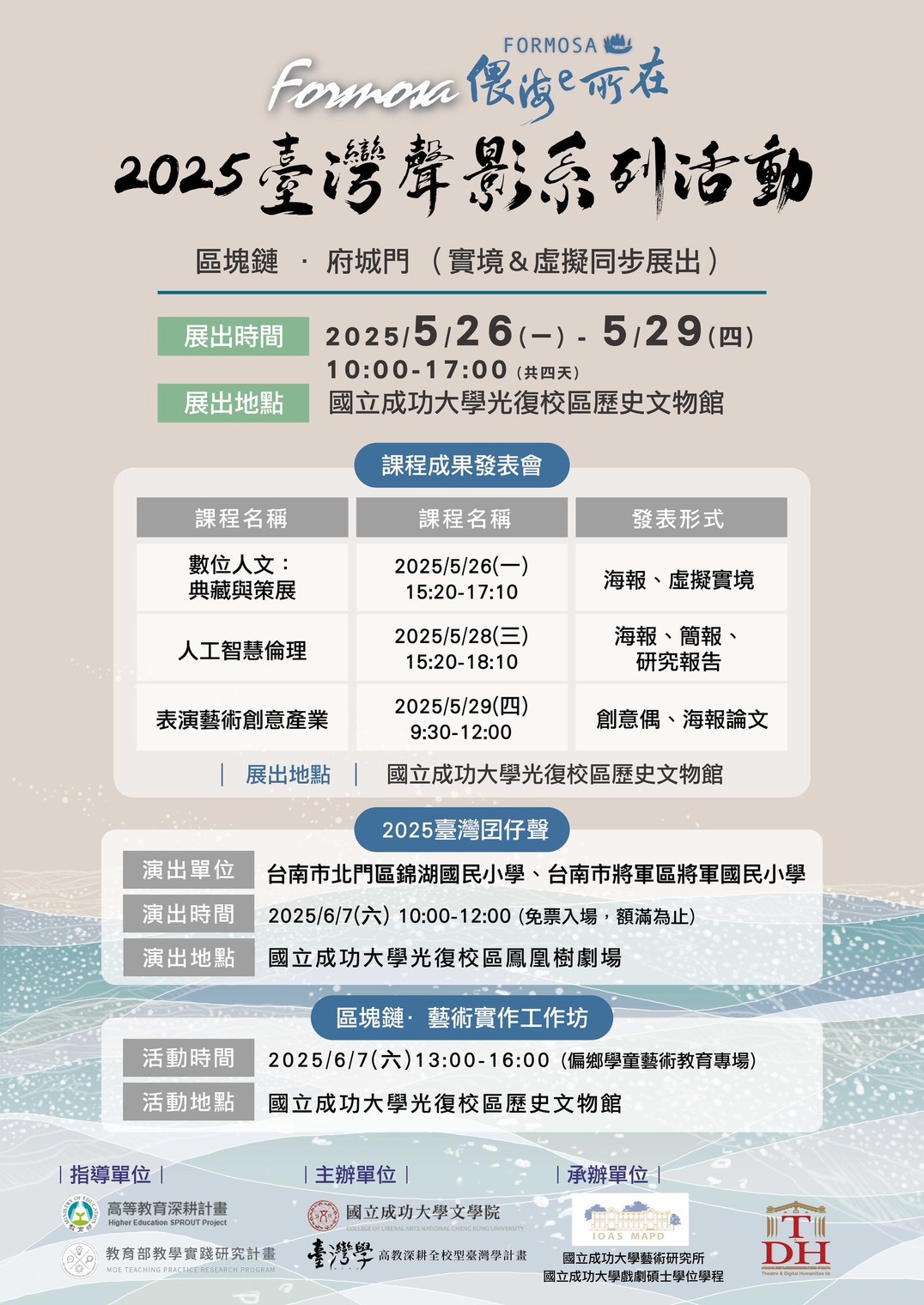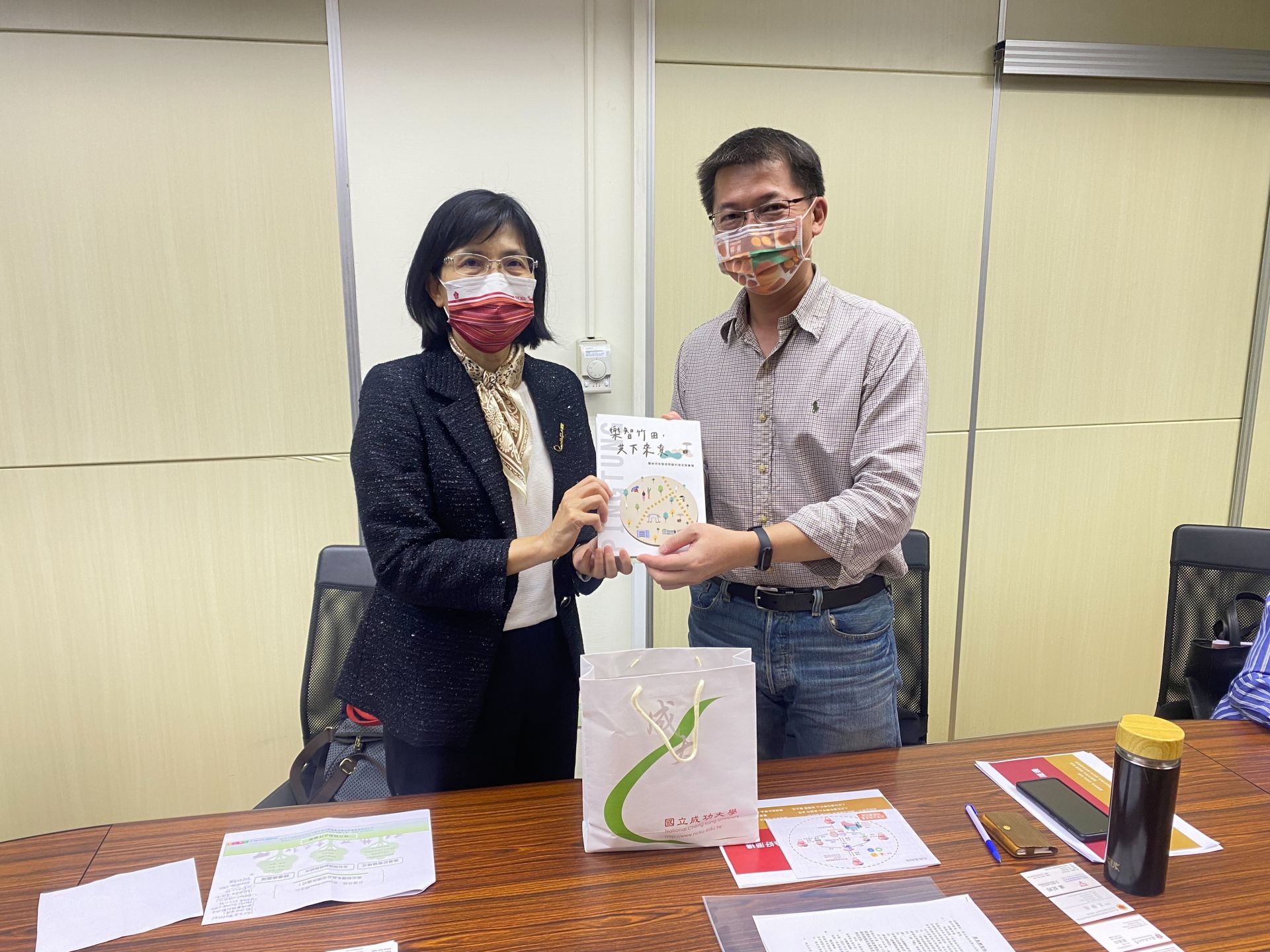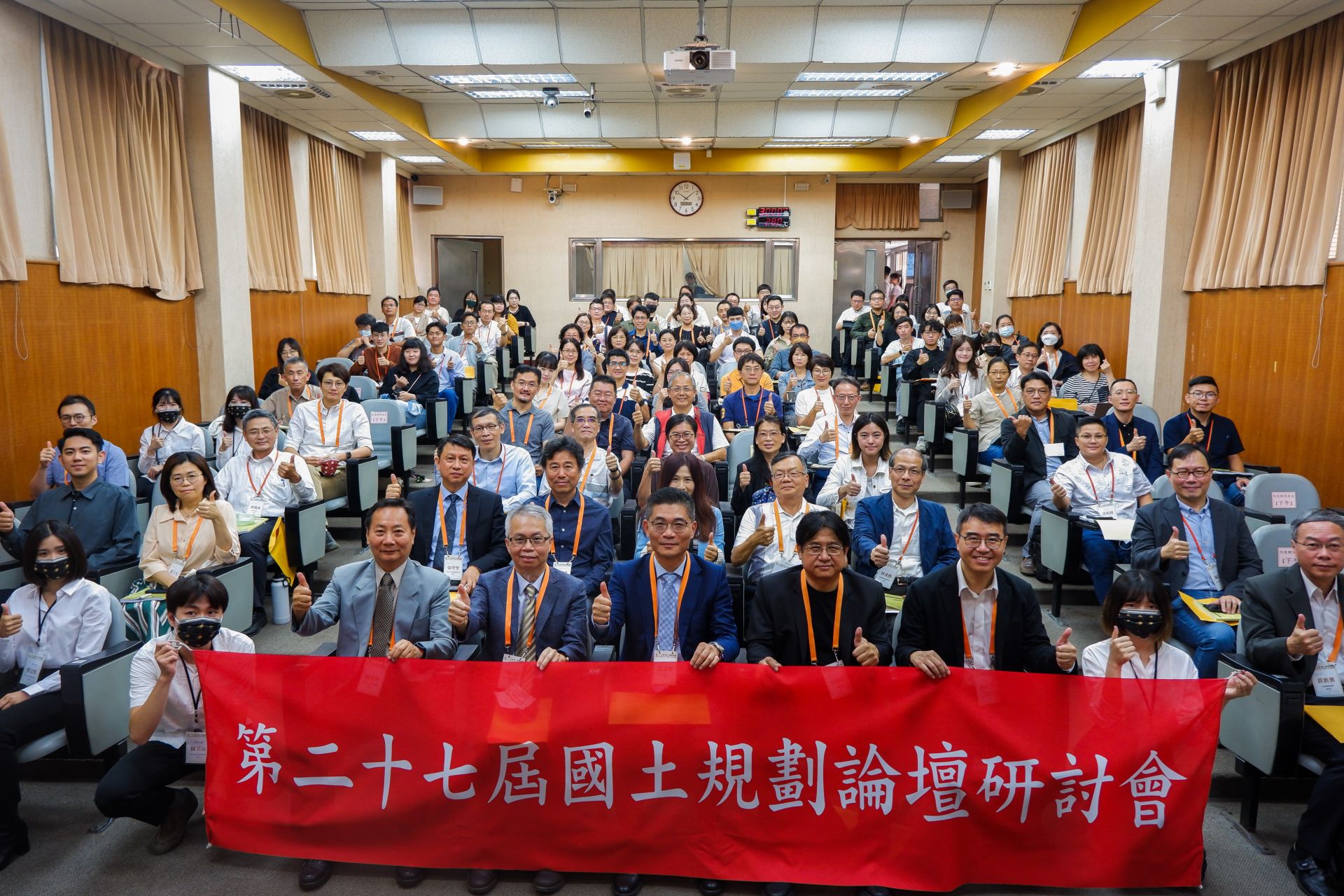SDG11
NCKU “Formosa: e-Place by the Sea” – 2025 Taiwan Sound & Image Series, Virtual Meets Reality, Creativity Unleashed
Now in its sixth year, National Cheng Kung University’s (NCKU) Taiwan Studies Program presents the 2025 "Formosa: e-Place by the Sea – Taiwan Sound & Image Series." Taking place from late May to early June, this year’s theme, “Blockchain: The Gates of Tainan,” brings together three interdisciplinary courses—Digital Humanities: Archives & Curation, AI Ethics, and Creative Industries in Performing Arts. The event features hybrid performances that showcase students’ semester-long creative explorations.
The “Formosa: e-Place by the Sea” project begins from a 17th-century maritime perspective to explore the rich history of Anping (Tayouan)—Taiwan’s oldest international port town. It highlights the area’s development from prehistoric Indigenous cultures to the post-17th-century era. Integrating disciplines such as history, oceanography, archaeology, cultural heritage, drama, and the humanities, the project also incorporates AR, VR, and MR technologies, allowing audiences to virtually step into historical contexts and gain deeper insight into the past.
Chia-Pin Chen, Associate Professor at NCKU’s Institute of Art Studies and Director of Research and Curation at the Art Center, stated that this is an interdisciplinary showcase blending art, technology, humanities, and local memory. Students transformed their creativity into a public language, inviting the audience to step into the time-space corridor of “Blockchain: The Gates of Tainan” to experience the rhythm and imagination of Taiwan’s sights and sounds in 2025.
The “Taiwan Sound & Vision Series” features three project showcases, one performance, and one workshop. The first event, the Digital Humanities: Archiving and Curation Course Showcase, was held on May 26 at the Historical Artifacts Museum on NCKU’s Kuang-Fu Campus. The exhibition presented 22 works blending virtual galleries and physical posters, covering themes such as cultural memory, visual storytelling, and social issues. For instance, Jing-Hsin Li from the Department of Chinese Literature created a virtual exhibition titled A Glimpse into Malaysian Chinese Culture, reflecting on childhood memories and cultural life. Meanwhile, Chieh-Yang Chen from the Department of Electrical Engineering explored the emotional power of video games—arguing it surpasses that of films—through an aesthetic synthesis of philosophy, economics, and design.
On May 28 and 29 afternoons, two events were held at the Historical Artifacts Museum: a presentation and video showcase from the AI Ethics course, followed by a creative puppet performance from the Performing Arts and Creative Industries course.
The “AI Ethics” course is a collaborative offering from the AI Alliance Universities, guided by multiple instructors to help students explore ethical controversies and social challenges related to AI. The exhibition showcases students’ visual and multimedia creations addressing contemporary issues such as algorithmic bias, gender stereotypes, and labor exploitation, demonstrating deep critical thinking and innovation—from AI model design to reflections on societal structures.
The “Performing Arts Creative Industry” course focuses on design thinking and arts education to create original puppets. Students start from design concepts, select materials, and craft story-rich puppets by hand. Their creations also connect to the cultural heritage of Tainan’s 300-year-old city founding, allowing the puppets to transcend time and space, bringing strong visual impact and cultural warmth to the physical exhibition.
On the morning of June 7, a performance of “Voices of Taiwan’s Children” will be held at the Phoenix Theater on Guangfu Campus, in collaboration with Tainan Municipal Beimen District Jinhu Elementary School and Jiangjun District Jiangjun Elementary School. That afternoon, a “Blockchain Art Workshop” focused on promoting art education for students in remote areas will take place at the Historical Artifacts Museum.
Marking the 300th anniversary of Tainan’s founding, NCKU aims to cultivate creative and socially conscious youth by continuously promoting an “Aesthetic Campus” and arts education. This exhibition features students’ free and diverse ideas, rooted in everyday life and genuine concerns—without constraints or conformity. It is vibrant, culturally rich, and warmly welcomes everyone to visit and celebrate together.
The “Formosa: e-Place by the Sea” project begins from a 17th-century maritime perspective to explore the rich history of Anping (Tayouan)—Taiwan’s oldest international port town. It highlights the area’s development from prehistoric Indigenous cultures to the post-17th-century era. Integrating disciplines such as history, oceanography, archaeology, cultural heritage, drama, and the humanities, the project also incorporates AR, VR, and MR technologies, allowing audiences to virtually step into historical contexts and gain deeper insight into the past.
Chia-Pin Chen, Associate Professor at NCKU’s Institute of Art Studies and Director of Research and Curation at the Art Center, stated that this is an interdisciplinary showcase blending art, technology, humanities, and local memory. Students transformed their creativity into a public language, inviting the audience to step into the time-space corridor of “Blockchain: The Gates of Tainan” to experience the rhythm and imagination of Taiwan’s sights and sounds in 2025.
The “Taiwan Sound & Vision Series” features three project showcases, one performance, and one workshop. The first event, the Digital Humanities: Archiving and Curation Course Showcase, was held on May 26 at the Historical Artifacts Museum on NCKU’s Kuang-Fu Campus. The exhibition presented 22 works blending virtual galleries and physical posters, covering themes such as cultural memory, visual storytelling, and social issues. For instance, Jing-Hsin Li from the Department of Chinese Literature created a virtual exhibition titled A Glimpse into Malaysian Chinese Culture, reflecting on childhood memories and cultural life. Meanwhile, Chieh-Yang Chen from the Department of Electrical Engineering explored the emotional power of video games—arguing it surpasses that of films—through an aesthetic synthesis of philosophy, economics, and design.
On May 28 and 29 afternoons, two events were held at the Historical Artifacts Museum: a presentation and video showcase from the AI Ethics course, followed by a creative puppet performance from the Performing Arts and Creative Industries course.
The “AI Ethics” course is a collaborative offering from the AI Alliance Universities, guided by multiple instructors to help students explore ethical controversies and social challenges related to AI. The exhibition showcases students’ visual and multimedia creations addressing contemporary issues such as algorithmic bias, gender stereotypes, and labor exploitation, demonstrating deep critical thinking and innovation—from AI model design to reflections on societal structures.
The “Performing Arts Creative Industry” course focuses on design thinking and arts education to create original puppets. Students start from design concepts, select materials, and craft story-rich puppets by hand. Their creations also connect to the cultural heritage of Tainan’s 300-year-old city founding, allowing the puppets to transcend time and space, bringing strong visual impact and cultural warmth to the physical exhibition.
On the morning of June 7, a performance of “Voices of Taiwan’s Children” will be held at the Phoenix Theater on Guangfu Campus, in collaboration with Tainan Municipal Beimen District Jinhu Elementary School and Jiangjun District Jiangjun Elementary School. That afternoon, a “Blockchain Art Workshop” focused on promoting art education for students in remote areas will take place at the Historical Artifacts Museum.
Marking the 300th anniversary of Tainan’s founding, NCKU aims to cultivate creative and socially conscious youth by continuously promoting an “Aesthetic Campus” and arts education. This exhibition features students’ free and diverse ideas, rooted in everyday life and genuine concerns—without constraints or conformity. It is vibrant, culturally rich, and warmly welcomes everyone to visit and celebrate together.

2025 Taiwan Sound & Vision Series Event Poster

SDG11NCKU and the New Ping-Tung County Government Team Meet for Building a World-Class Senior Living Model
View more![[USR Feature Report] The Power that Drives Learning: Badlands 3.0 Aims to Become a Resilience Cultivation Practice Base](/userfiles/images/20250620083304584.jpg)
SDG11[USR Feature Report] The Power that Drives Learning: Badlands 3.0 Aims to Become a Resilience Cultivation Practice Base
View more



















